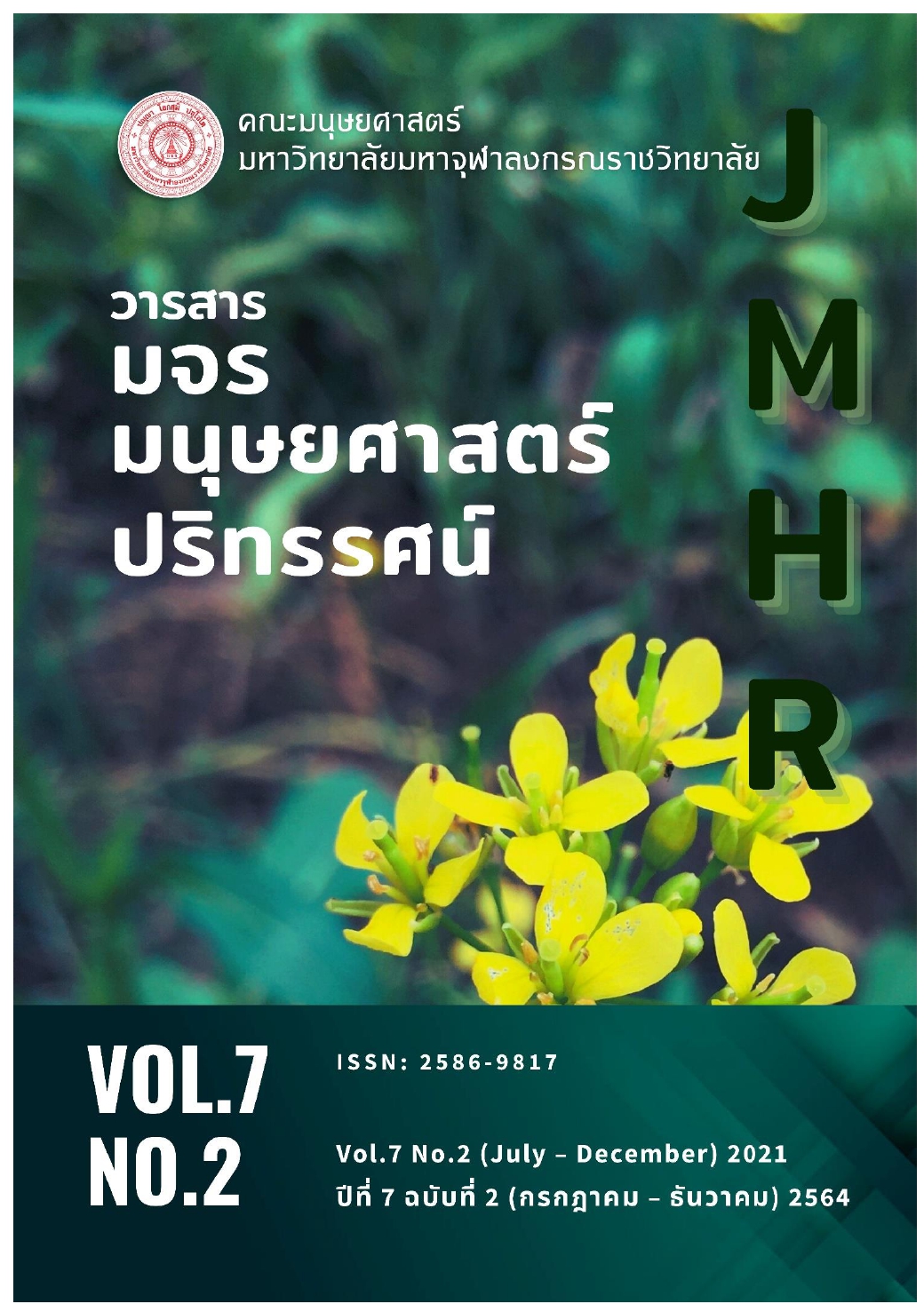การวิจัยอนาคตกับองค์ความรู้ทางพุทธจิตวิทยา
คำสำคัญ:
การวิจัยอนาคต, องค์ความรู้, พุทธจิตวิทยาบทคัดย่อ
บทความนี้มุ่งเสนอให้เห็นถึงความสำคัญของ การวิจัยอนาคต (Futures Research) ซึ่งเป็นวิธีวิทยาการวิจัยทางวิทยาศาสตร์ ที่สามารถคาดการณ์แนวโน้มที่มีความเป็นไปได้ หรือน่าจะเป็นไปในอนาคต ทั้งในด้านบวกและด้านลบ การศึกษาอนาคต (Futures Studies) ผ่านวิธีวิทยาการวิจัยอนาคตนั้น สามารถสร้างองค์ความรู้ใหม่ที่มีหลักการ มีกระบวนการ วิธีการที่ชัดเจน และเป็นระบบทำให้เห็นภาพอนาคตที่เป็นองค์รวม มีประโยชน์ทั้งต่อบุคคลและองค์กรต่าง ๆ โดยสามารถนำไปประยุกต์ใช้กับการบริหาร การวางแผนเพื่อการรับมือกับอนาคตตามสาขาวิชาชีพต่าง ๆ โดยเฉพาะอย่างยิ่ง การวิจัยอนาคตที่เกี่ยวกับพุทธจิตวิทยา ซึ่งเป็นองค์ความรู้ทางธรรมเกี่ยวกับจิตของมนุษย์ ก่อให้เกิดปัญญาสู่การหลุดพ้นนั้น นอกจากจะทำให้เกิดมุมมองความน่าจะเป็นของอนาคตอย่างเป็นเหตุเป็นผลแล้ว ยังทำให้เกิดทักษะในการคิดพิจารณาในด้านต่าง ๆ ได้อย่างละเอียด ลึกซึ้ง ปราณีตและสร้างสรรค์มากยิ่งขึ้น นำมาสู่หลักการ Logical Trend with 6’S ซึ่งเป็นหลักการพื้นฐานทำให้คนในสังคมหรือองค์กร สามารถก้าวทันการเปลี่ยนแปลงของโลกอนาคตได้อย่างมีสติ และสามารถนำไปประยุกต์ใช้กับการวางแผนพัฒนาเพื่อความยั่งยืนขององค์กรได้ด้วยเช่นกัน
เอกสารอ้างอิง
จุมพล พูลภัทรชีวิน. (2529). การวิจัยอนาคต. วารสารวิธีวิทยาการวิจัย, 1(1). 22-24.
“__________”. (2559). การวิจัยเชิงอนาคต. เอกสารประกอบการบรรยายใน การอบรมสัมมนาวิชาการมหกรรมงานวิจัยแห่งชาติ 2559. กรุงเทพฯ: โรงแรมเซ็นทาราแกรนด์และบางกอกคอนเวนชันเซ็นเตอร์ เซ็นทรัลเวิลด์
.
จุมพล พูลภัทรชีวิน และจุฬากรณ์ มาเสถียรวงศ์. (2552). ความรู้เบื้องต้นเกี่ยวกับแนวคิดทฤษฎีการศึกษาอนาคตวิทยา. สืบค้น 20 ตุลาคม 2564, จาก http://midnightuniv.tumrai.com/midnighttext/0009999724.html
ชมพูนุช ศรีจันทร์นิล. (2552). จิตวิทยาแนวพุทธ. แนวทางเพื่อการเยียวยาและพัฒนาจิตใจมนุษย์. วารสารวิชาการมหาวิทยาลัยหอการค้าไทย, 29(4), 192.
เทียนฉาย กีระนันทน์. (2544). สังคมศาสตร์วิจัย (พิมพ์ครั้งที่ 5). กรุงเทพฯ: คณะเศรษฐศาสตร์ จุฬาลงกรณ์มหาวิทยาลัย.
ธัชเฉลิม สุทธิพงษ์ประชา และธันยพร สุนทรธรรม. (2561). คู่มือการมองอนาคต (ฉบับปรับปรุง). กรุงเทพฯ: วิทยาลัยสหวิทยาการ มหาวิทยาลัยธรรมศาสตร์.
นิภาพรรณ เจนสันติกุล. (2560). การนำเทคนิคเดลฟายไปใช้สำหรับการวิจัย. วารสารรัฐศาสตร์ปริทรรศน์ มหาวิทยาลัยเกษตรศาสตร์, 4(2), 47-64.
ประตูสู่ธรรม. (2564). ขันธ์ 5. สืบค้น 15 ธันวาคม 2564, จาก http://www.dharma-Gateway.com/ubasika/nina/abhidham-03.htm
พรธิดา วิเชียรปัญญา. (2547). แนวคิดเบื้องต้นเกี่ยวกับการจัดการความรู้. กรุงเทพฯ: ธรรกมลการพิมพ์.
พระครูปลัดมารุต วรมงฺคโล. (2553). การศึกษาวิเคราะห์พุทธจิตวิทยาในพระไตรปิฎก (รายงานผลการวิจัย). มหาวิทยาลัยมหาจุฬาลงกรณราชวิทยาลัย. พระนครศรีอยุธยา
พระพรหมบัณฑิต. (2564). MCU TV: การบรรยายพิเศษในวันไห้วครู: พุทธจิตวิทยากับศาสตร์สมัยไหม่พัฒนาจิตใจมนุษย์. สืบค้น 20 ตุลาคม 2564, จาก https://www.youtube.com/watch?v=iKfvtLd0whk
พระมหาโสภณ วิจิตฺตธมฺโม และ พระมหาณรงค์ศักดิ์ ฐิติญาโณ. (2558). การศึกษาวิเคราะห์การตีความพระอภิธรรมของพระเถระในพระพุทธศาสนา. วารสาร มจร มนุษยศาสตร์ปริทรรศน์, 1(1), 45-57.
พุทธรักษ ปราบนอก. (2564) จิตวิทยาในพระอภิธรรม. เอกสารประกอบการสอนรายวิชาพระไตรปิฎกศึกษา 3. สืบค้น 17 พฤศจิกายน 2564, จาก https://shorturl.asia/ub0om
ภาณุวังโส. (2549). เกินกว่าฟรอยด์จะจินตนาการ. กรุงเทพฯ: มายแบงค็อกพับลิชิ่งเฮ้าส์. มหาวิทยาลัยมหิดล. (2564). การจัดการความรู้. สืบค้น 17 พฤศจิกายน 2564, จาก https://quality.sc.mahidol.ac.th/plan_and_policy/km/
โรงเรียนมหาชนะชัยวิทยาคม. (2564). องค์ความรู้. สืบค้น 17 พฤศจิกายน 2564, จาก http://www.thaischool1.in.th/_files_school/90100748/data/90100748_1_20190912-111726.pdf
สมจิตร อุดม. (2549). การศึกษาเทคนิคเดลฟายเพื่อการศึกษาวิจัย. วารสารสำนักหอสมุดมหาวิทยาลัยทักษิณ, 5(1), 44-51.
สมเด็จพระพุทธโฆษาจารย์ (ป. อ. ปยุตฺโต). (2561). จากจิตวิทยาสู่จิตภาวนา (พิมพ์ครั้งที่ 23). กรุงเทพฯ: ธรรมสภา.
สมเด็จพระพุทธโฆษาจารย์ (ป. อ. ปยุตฺโต). (2564). พจนานุกรมพุทธศาสน์ ฉบับประมวลศัพท์ (พิมพ์ครั้งที่ 35). กรุงเทพฯ: โรงพิมพ์บริษัท สหธรรมิก จำกัด.
สำนักงานบริการวิชาการ มหาวิทยาลัยเชียงใหม่. (2564). KM การเรียนรู้องค์กร. สืบค้น 20 ธันวาคม 2564, จาก https://www.uniserv.cmu.ac.th/km/
อภิวัฒน์ รัตนวราหะ. (2563). อนาคตศึกษา (พิมพ์ครั้งที่ 2). เชียงใหม่: หจก.ล๊อคอินดีไซน์เวิร์ค.
อุเทน เข้มขัน. (2564). BOK Body of Knowledge คืออะไร. สืบค้น 17 พฤศจิกายน 2564, จาก https://www.qmlcorp.com/content/7424/bok-body-of-knowledge-คืออะไร
Caroline A. F. Rhys Davids. (1900). A Buddhist Manual of Psychological Ethics of the Fourth Century B. C. London: Royal Asiatic Society. Retrieved 16 December 2021, from https://books.google.co.th/books?id=ON4KAA AAYAAJ
&printsec=frontcover&hl=th&source=gbs_ge_summary_r&cad=0#v=onepage&q&f=true
Chumpol Poolpatarachewin. (1986). Ethnographic Delphi Futures Research. Journal of Research Methodology. 1(2). 24-33.
Jenny Andersson. (2018). The Future of the World. Futurology, Futurists, and the Struggle for the Post-Cold War Imagination. Oxford: Oxford University Press.
Matthieu Ballandonne. (2020). The history of futures studies: A note on Gilfillan’s early work. Technological Forecasting & Social Change: An Electronic Journal. 157. Retrieved 16 December 2021, from https://www.sciencedirect.com/science/article/pii/S0040162519304937
Olaf Helmer-Hirschberg. (1967). Analysis of the Future: The Delphi Method. Retrieved 16 December 2021, from ttps://www.rand.org/pubs/papers/hP3558.html
Robert B. Textor. (1980). A Handbook on Ethnographic Futures Research (3rd ed.). California: Cultural and Educational Futures Research Project of Education and Department of Anthropology Stanford University.






